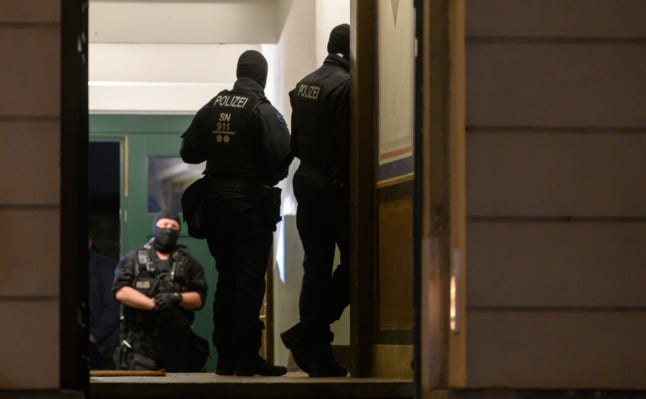The security forces in Saxony acted following the threats from an anti-vaccine group against Saxony state premier Michael Kretschmer.
“Statements from certain members of the group suggested they might have real weapons,” police said in a statement.
Last week, special forces officials announced that a Telegram chat group called ‘Dresden Offline Connection’ was involved.
In their communication and in conversations at secret and partly openly filmed meetings in the greater Dresden area, there had been statements about assassination plans concerning Kretschmer and other representatives of the state government.
An investigation was opened after journalists from public broadcaster ZDF infiltrated the Telegram chat and reported on December 7th that there were death threats allegedly issued against Kretschmer.
ZDF revealed the contents of messages allegedly involving a hundred members of the chat group “linked by their opposition to vaccines, to the state and the current health policies”, the prosecutor said.
Audio messages called for opposing “if necessary with weapons” the Covid measures in place, targeting politicians — Kretschmer in particular.
Authorities suspected “the preparation of a violent crime that threatens the state”, Saxony police said on Twitter.
Anti-vaccination movement
A large movement has emerged in Germany against health restrictions imposed during the Covid-19 pandemic.
It is particularly strong in Saxony, in former East Germany, one of the regions worst hit by the resurgent coronavirus and where the vaccination rate is lower than the national average.
At the beginning of December, protestors gathered outside the house of the Saxony state minister of health with torches and whistles, a demonstration which was condemned by politicians.

Saxony state premier Michael Kretschmer (CDU) leaves the state chancellery on November 30th, 2021. Photo: picture alliance/dpa/dpa-Zentralbild | Sebastian Kahnert
READ ALSO: Germany’s new government condemns ‘aggressive’ anti-vax movement
In the midst of a strong fourth wave of the virus, the German government decided to strengthen restrictions on unvaccinated people, banning them from public venues, restaurants and non-essential commerce.
Compulsory vaccination could be voted on by the German parliament in the coming weeks, with the obligation to get the jab coming into force in February or March.
The number of individuals opposed to the health restrictions and prepared to use violence was between 15,000 and 20,000, Social Democrat security expert Sebastian Fiedler said on Tuesday in an interview with the German daily Bild.
Telegram should ‘eliminate hate and agitation’
The news also comes amid growing calls for action against Telegram.
Speaking to the Augsburger Allgemeine on Wednesday, Bavarian state premier Markus Söder said the encrypted messaging service was becoming a central route for hate and agitation on the internet.
“First of all, one has to make the clear demand to Telegram to eliminate hate and agitation and also make it legally binding,” he said. “Should that service then not agree to help, then there are also ways to block it.”
READ ALSO: German protests against Covid restrictions turn nasty
The Federal Office of Justice categorises Telegram as a social network, rather than a simple messaging service – meaning that it falls under the same regulations as Facebook and Twitter. Under these laws, criminal content should be blocked or deleted quickly.
According to the Federal Office for the Protection of the Constitution, supporters of the Covid-denier scene often use the service to spread their messages and mobilise for demonstrations and events.
By Sebastien Ash, with additional reporting by The Local
Vocabulary
Special forces – (die) Spezialkräfte
Death threats – (die) Morddrohungen
Encrypted – verschlüsselt
Legally binding – rechtlich verbindlich
We’re aiming to help our readers improve their German by translating vocabulary from some of our news stories. Did you find this article useful? Let us know.



 Please whitelist us to continue reading.
Please whitelist us to continue reading.
Member comments